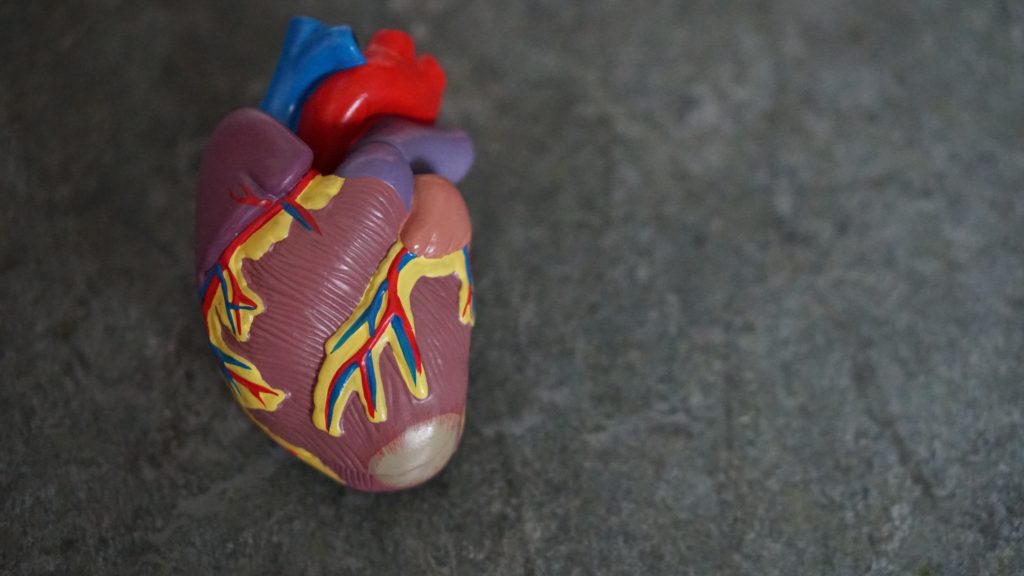How Does Heart Health Factor Into Your Lifespan?
Contributed by Ryan Peterson.

Your heart is by far one of the most important organs in your body. Providing oxygen to your muscles, organs, and brain, the beating center of your body would be impossible to live without. Of course, though, many people go through life without considering the health of their heart, making lifestyle choices that will ultimately leave them in a bad position. To help you out with this, this article will be exploring how heart health can impact your lifespan, along with some of the tools that can be used to combat poor heart health.
How Important Is Your Heart?
As mentioned above, your heart is one of the most crucial organs inside your body. Your heart moves blood around your body, transporting oxygen that is captured in your lungs, nutrients from your stomach, and cells that are vital to your immune system around your body. Without the pumping of the heart, you can die within a short window of time. This goes to show just how important the heart is for life. You must look after the health of your heart.
Can You Replace Your Heart?
Medical science has come a long way over the last few years, and it’s become possible to replace many organs with synthetic alternatives or transplants from donors. Of course, undergoing a heart transplant is an extremely serious procedure, and it isn’t something you should use as a contingency plan in case your heart health worsens. Serious heart problems can shave decades off of your lifespan, and a transplant will often only be a temporary solution.
Continue readingMaintaining A Healthy Heart: 5 Simple Mistakes That Are Holding You Back
Contributed by Ryan Peterson.

Whether you have a family history of heart problems or simply appreciate the rewards of keeping yours in check doesn’t matter. Maintaining a healthy heart should be a priority for all. Sadly, millions of people fail to unlock the best results despite making a conscious effort. Instead, they continue to restrict themselves by committing very basic faux pas.
Here are five of the most common traps you may be guilty of falling into. If you are, now is the time to regain control of the situation.
1. Allowing stress to take over
Stress is responsible for the onset of many different problems. This includes several issues that increase the threat of heart attacks. While it’s impossible to banish stress from your life, several positive steps can be taken. Fighting financial stress and investing in better sleep patterns should be at the top of your agenda. Above all else, you should be willing to talk about any concerns you have. Bottling things inside allows stress to grow until it takes a toll.
2. Not eating enough
Obesity is a major cause of poor heart health. However, extreme diets and calorie deficits may be equally harmful. The key is to maintain a healthy weight while ensuring your body obtains the needed nutrients to promote healthy organs. A centrifugal juicer encourages you to increase your fruit and vegetable consumption. Place your focus on vitamins your need for a healthy heart, such as vitamin D. You then realize it’s imperative that you keep eating, but select the right foods.
Continue readingMake Your Health Goals a Reality: Wishes vs Goals

How will you be closer to your health goals in 6-months? Do you have a plan to make your health goals a reality?
I dislike New Years Resolutions. It’s said a resolution is simply a wish… and how often do wishes come true on their own? It takes work to achieve what you seek. I like the start of the new year because it makes us reflect on where we are and where we want to go but I prefer approaching the future with goals.
Goal setting supports success.
Here is the actual goal tracker I used this year. It’s a template for setting goals in seven key areas of your life.
For our purposes, we will focus on the physical because I’m all about what you can do to improve your health, specifically your heart health.
Now, let’s cover the five steps you must take to ensure success.
- Recognize your big vision
- Set a goal
- Outline the action plan
- Plan for obstacles
- Assess progress
1. Recognize your big vision
Big vision (I’m giving you an example here) is to feel good so you enjoy time with family and can easily participate in activities.
2. Set a goal
Let’s pretend you have high blood pressure and it is currently being managed with medication and the medication has unpleasant side effects. You could set a goal to be off medication within the next 12-months; however, I would set the goal to be “Reduce blood pressure medication by half in the next 6-months.” You are more likely to stay motivated by setting shorter goals and achieving those goals quicker.
3. Outline the action plan
Now, if you stop there, it is a wish and not a goal. You need to dig in to the concrete steps you are will take.
The program Heart Health Made Easy lays out many steps to implement, but let’s pick one as an example.
The first step will be to increase your physical activity. By increasing your heart rate during activity you strengthen the heart muscle which allows the heart to pump blood more efficiently.
Good choices to lower blood pressure include walking, jogging, cycling, swimming, and dancing. Start where you are. If you are inactive, you would select walking over jogging. Work your way up.
Be even more specific to make your health goals a reality.
I commit to walking 30 minutes 4 times per week (Monday, Wednesday, Friday, and Saturday) during my noon lunch hour.
Next, grab your calendar and add the dates and times you will be taking a 30-minute walk. If you don’t regularly look at a wall calendar then that is not the place. Treat this time like any other appointment you would schedule.
4. Plan for obstacles
Try to think of everything that could impact your decision to walk when the day and pre-determined time rolls around.
- What if it snowing or raining? What is your back up plan?
- What if something out of your control occurs and your intended walking time is simply not doable? What is your back up plan?
- What if you head home from work with good intentions but sit on the couch and just don’t have the motivation to get back up?
- If you have children – are they going with you or do you need child care plans?
- Do you have walking shoes?
- Is it cold where you live? Do you need to find indoor locations to walk or go through your wardrobe for layers to bundle up?
All examples to get you thinking. Decide how you will overcome obstacles in a way that works for you. There will be obstacles. Have a plan. If you do not, you will not hit your goal.
5. Assess progress
As you complete the desired activity, mark it complete on your schedule. This gives a visual tool to monitor your progress. Look back and assess how many days each week did you complete the activity.
Mark your calendar to review the entire goal tracker at least once a month. If you take the time to fill this out but then file it away and don’t look at it again… what was the point? Review at least once a month and assess if you have implemented all outlined steps to achieve the desired goal. Are you on track? If not, what do you need to change?
Wishing you all the best as you make your health goals a reality!
Lisa Nelson RD
Five Easy Ways to Improve Your Heart Health
Contributed by Ryan Peterson.

It’s estimated 33% of Americans have hypertension which contributes to heart problems. Not only that, cardiovascular disease is cited as one of the most common causes of death, with 17.3 million deaths each year. There are steps you can take to keep your heart healthy. First, avoid the obviously unhealthy choices, such as cigarettes and alcohol. They may feel like they help you unwind and relax, but in terms of your body chemistry, they are actually causing your body stress and damage. Second, incorporate healthy behaviors into your daily routine.
Improve Sleep Patterns
A big part of maintaining a healthy heart is improving the supporting conditions around heart health. That includes being active and eating a heart-healthy diet, but it also means getting enough good quality sleep. Poor sleep increases the risk of heart disease and contributes to many of the conditions around it, such as obesity, high blood pressure, and diabetes.
Get Active
Continue reading12 Things To Do Everyday For Your Heart Health
Contributed by Ryan Peterson.
Unfortunately, we can’t stay young forever. By the time many of us realize we’re ‘getting on a bit’, some damage has already been done to our health. By vowing to take care of your overall health now, and especially your heart health, you’ll live a longer, better quality life with fewer healthcare costs in the long run. Living a healthy lifestyle does not have to equal ‘boring’.
Here are 12 things to do everyday for your heart health:
1. Eat Healthy Fats
Healthy fats include foods like nuts, peanut butter, and oily fish. Avoid trans fats at all costs – you typically find trans fats in processed food. Trans fats increase your risk of stroke and heart disease. Consuming trans fats regularly makes you more susceptible to problems. Become comfortable reading nutritional labels before buying products to ensure you avoid foods containing trans fats.
2. Practice Good Dental Hygiene
Oral bacteria associated with gum disease can travel through the bloodstream and increase your risk of heart disease. Poor dental hygiene can lead to heart disease. It isn’t about vanity – looking after your teeth is key for overall health. Make sure you’re doing the following:
- Brush twice a day.
- Brush teeth for two minutes, but do not brush so hard you wear your enamel down.
- Floss at least once a day to get rid of debris between the teeth.
- Using mouthwash to rinse away any leftover bacteria and freshen your breath.
- Use a tongue scraper. Brushing your tongue is good, but you may sometimes just move around the bacteria without getting rid of it.
3. Get Plenty of Sleep
Prioritize your sleep. You have a higher risk of cardiovascular disease if you don’t get sleep. It can be tempting to burn the candle at both ends if you have goals you want to achieve, but people who sleep fewer than 6 hours a night are twice as likely to have a stroke or heart attack compared to people who sleep 6 to 8 hours a night. Aiming for 7 to 8 hours of sleep a night is ideal. Implement a consistent bedtime routine. Going to bed at the same time each night is a great start.
4. Avoid Sitting Down For Too Long
Continue readingFollowing keto, paleo, plant-based, Mediterranean or something in between? Remember the 4-4-9 rule.
Functional medicine expert Bryce Wylde explains why everyone, no matter what diet plan you follow, will do better by incorporating healthy fats.

Whether for health or weight loss, there may never be a way of eating that is perfect for everyone. “About 25 percent of people gain weight while following a strict keto diet,” observes Functional Medicine expert Bryce Wylde, BSc, DHMHS, Homeopath. “Some people gain weight on carbohydrates. Others do not. Some people are better off eating vegan. But one thing is universal: Everyone would do really well to incorporate healthy fats into their diets.”
As a clinical practitioner, Wylde understands that an individual’s DNA at least partially dictates how their body responds to food. “There are genes that dictate whether your body tends to store fat or burn it as ketones. There are genes that influence if people are good starch metabolizers. They can eat rice and beans all day without issue. For others, it might be best to sway over to meats and fats.”
He encourages people not to go all the way down one road dietarily unless they understand themselves better. “In the most general terms, you can have your DNA analyzed then use a self-decode website to turn those results into actionable items.”
The 4-4-9 rule and other healthy eating tips
In the meantime, Wylde offers his advice for fueling your body with the right nutrients.
Continue reading


